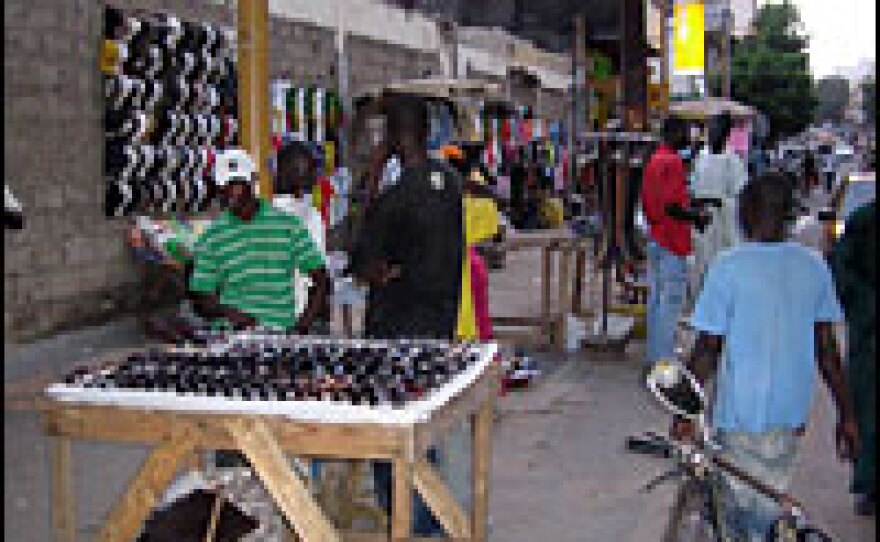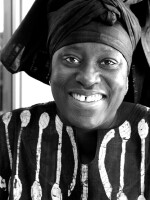
Not much has been heard from Africa about the impact of the global financial crisis that has sent markets tumbling, banks collapsing and homeowners fearing foreclosure. But there is concern on the world's poorest continent that the financial fever and fallout will be contagious.
In dusty downtown Dakar, the bustling capital of Senegal, many residents may not fully follow the complexities of the recent financial turmoil on Wall Street and beyond. But the Senegalese are no strangers to the word "crisis." They face a crisis of survival daily.
As night falls in Dakar, street vendors desperately try to offload a few more items before the close of business. Many are too busy to talk.
But Moustapha Diouf was keen to share his views about the impact of the global financial crisis on Africa.
"I saw one ... an interview of one director of one bank here in Senegal," Diouf says. "He said the financial crisis would not affect the bank here in Senegal — in Africa in general. But ... I know very well that this will affect Africa, this will affect Senegal in general. For sure ... this will affect people like me — people who are here downtown selling things in order to go back to their home and feed their families."
Ndeye Sow, 26, hawks trinkets and traditional dolls up and down the streets of Dakar. She said she had been following news of the growing financial mess on the radio — then burst out with a litany of complaints about her immediate concern: the high cost of living in Senegal.
"What isn't expensive here in Senegal? Life is tough," says Sow, who has a 5-year-old son. She says fish is expensive; rice, too — even salt. "Everything has gone up in price in the market. Plus school fees, transport — you name it. Everything is expensive, yet no one has a proper job. We just can't afford to feed our families or send our children to school anymore. Every single day is a struggle."
Sow's concerns are mirrored all over Africa. She may not have a bank account, a mortgage, or stocks and shares, but that does not diminish her worries about trying to make ends meet. Crucial remittances are already down from Africans working abroad. They keep many families back home afloat.
The big question now for Africa is how badly it will be bruised by the global financial meltdown.
"It's becoming clear that many developing countries — African countries — will not be immune to the spillover effects of this global financial crisis," says former Nigerian finance minister and now World Bank Managing Director Ngozi Okonjo-Iweala. So, we consider that ... particularly poor people within these countries are now in a kind of danger zone. And the danger for them lies in the fact that they're taking a hit from what I call the "Four Fs" — the fuel crisis, food crisis, the fertilizer crisis and now the financial crisis."
Okonjo-Iweala is referring to the massive rise in the price of the three commodities — fuel, food and fertilizer — over the past year or so that has prompted riots in several African countries, including Senegal. She warns that the current global turbulence could certainly have a knock-on effect on the continent.
"In terms of the liquidity crunch, and in terms of the impact of exports, this could be the medium through which this is transmitted to developing countries — African countries," Okonjo-Iweala says. "And so, what we need to pay attention to is this quadruple whammy — food, fuel, fertilizer and finance — so that they begin to prepare how to bolster themselves to take care of these. And we can help."
But will that World Bank pledge make a difference to the lives of people like Ndeye Sow, the Senegalese street vendor?
Sow's priority right now is just to be able to put food on her table. She says nothing is going right in Senegal, and life is just too pricey. Looking beyond individual cases, there's also the issue of foreign aid — if donors are feeling the financial pinch, won't they be inclined to reduce aid to Africa?
"There is fear and uncertainty about that, but we ... hope that even though developed countries are struggling right now with their own crisis, that they will not cut back on what they have promised to the developing countries, because a 1 percent reduction in growth could trap 20 million more people into poverty," Okonjo-Iweala says.
Copyright 2022 NPR. To see more, visit https://www.npr.org. 9(MDAzMjM2NDYzMDEyMzc1Njk5NjAxNzY3OQ001))







